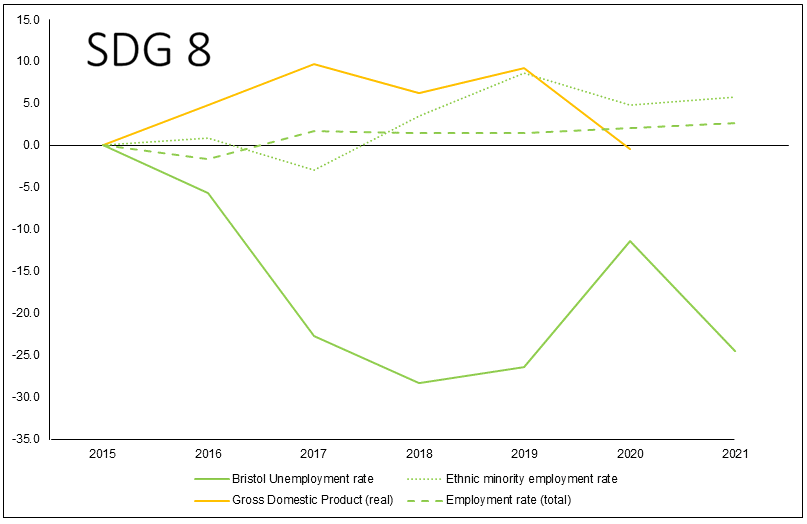SDG 8: Decent work and economic growth
What does the data show?
Indicators for SDG 8 are mixed. In real terms, Bristol’s Gross Domestic Product (GDP) rose from £16.1 billion in 2015 to £17.7 billion in 2017, before sliding back to £16 billion in 2020 in the wake of the pandemic. A similar pattern is seen with GDP per person, which fell from £35,758 in 2015 to £34,458 in 2020 after peaking in 2017.
Drilling down into key indicators of productivity, Bristol has seen growth in gross value added per hour, from £29.9 in 2015 to £33.6 in 2020, and per job filled (from £47,843 to £51,920). However, these figures are calculated in nominal rather than real terms and are below national averages. Business stock increased from 380 businesses per 100,000 population in 2016 to 388 in 2020.
Overall, the proportion of those unemployed in Bristol dropped from 5.3% in 2015 to 4% in 2021. However, these estimates conceal significant differences in employment across demographic groups over time. For example, male employment was stable between 2015 (80.2%) and 2021 (80.4%), while female employment grew rapidly from 73.2% to 79.1%.
By contrast, ethnic employment remains considerably lower than the city average and has shown limited convergence, with 64.5% employed in 2015 and 68.2% in 2021.
SDG 8: Decent work and economic growth
Overall, the proportion of those unemployed in Bristol dropped between 2015 and 2021.
However, these estimates conceal significant differences in employment across demographic groups over time. For example, male employment was stable over the same period, while female employment grew rapidly.
By contrast, ethnic employment remains considerably lower than the city average and has shown limited convergence.
Hourly pay has increased in recent years for both males and females: women still earn less per hour than men on average, but the gap has been decreasing with growth in women’s salaries outstripping growth in men’s salaries. Median hourly pay for male full-time workers grew from £14.38 in 2015 to £17.19 in 2021 while median hourly pay for female full-time workers grew from £12.78 to £16.42 over the same period.
What Bristol is doing
Racial inequality
Bristol established a Commission on Race Equality (CoRE), gathering commissioners from a variety of professions and industries to tackle racial inequality in the workplace and positions of decision making. The Economy Task Force within CoRE considers employment and enterprise in relation to race. It is delivering a two-year training programme targeting young Black and Minoritised people, providing opportunities in higher-level professional roles.
Placements and programmes for women
The Women’s Work Lab, founded in 2020, is a community interest company that helps unemployed mothers build employability skills through work placements and sponsorship programmes. Within its first year, the Lab received 65 applications for 15 spaces, demonstrating high demand for this resource. The women supported by the Lab in 2020 were from diverse backgrounds, with 42% identifying as Black, Asian or minority ethnic. They faced a number of challenges, with 60% being survivors of domestic abuse and 100% of their children receiving free school meals.
After the training, 100% of participants said they felt confident in returning to work. This programme is complemented by the efforts of the Bristol Women in Business Charter which aims to improve opportunities for women in the workforce, particularly in relation to work flexibility and opportunities. Since its launch in 2019, the charter has been signed by 40 companies which collectively employ 25,000.
Help for young people
Young Bristol is a charity striving to improve opportunities for young people. It runs programmes to help reduce youth unemployment, such as the Outdoor Employment Programme which offers free training to those interested in becoming outdoor activity instructors. Their Hartcliffe Club for Young People, in one of Bristol’s most deprived wards, provides accredited training courses for people aged 14-19. During the pandemic, Young Bristol supported 2,025 young people through their range of programmes.
Business West
Bristol’s largest business network, Business West, has recently registered itself as a B Corp. Through this accreditation and its work to support its members, Business West is consistently pushing for businesses across the region to address the SDGs. The organisation is at the forefront of integrating environmental, social, and economic sustainability into the work of its 24,000-strong member network.
Trends in key economic indicators
